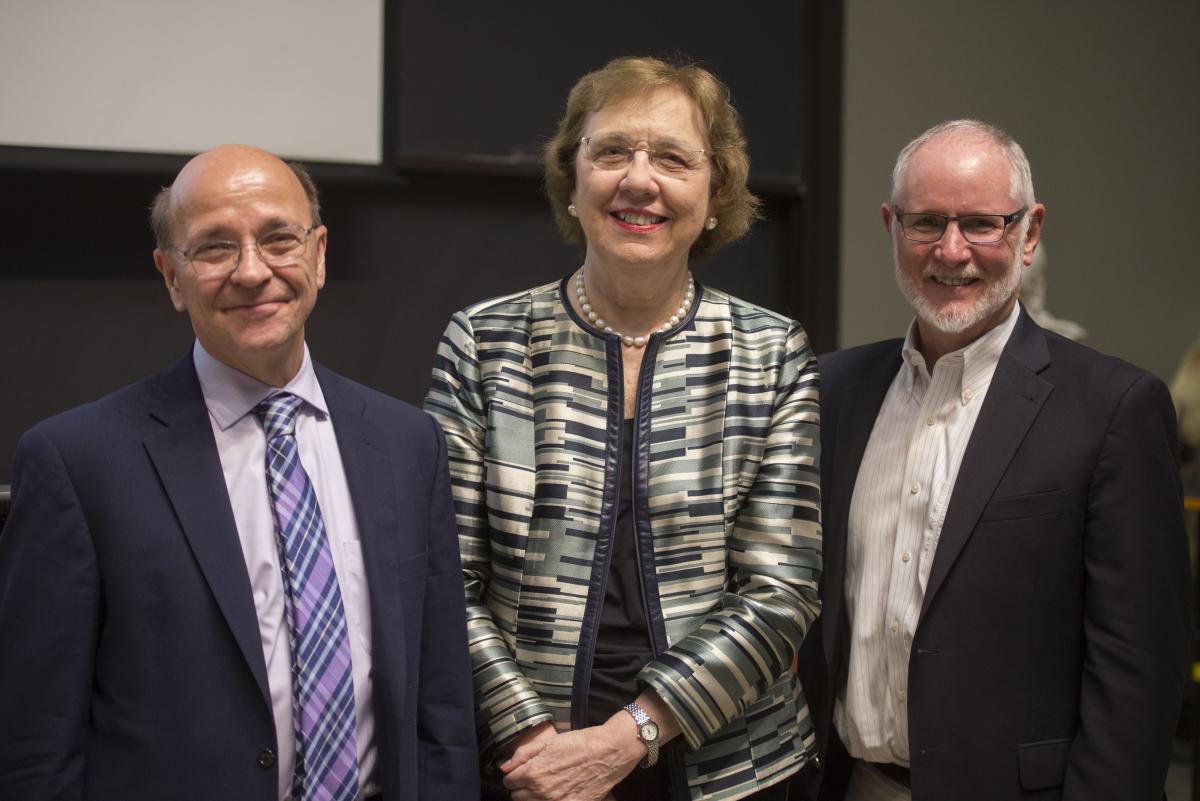
The 17th annual Seidman lecture, held on September 25, 2017, took a look at the future of health care from both sides of the political aisle. This lecture came as Congressional Republicans were attempting to repeal the U.S. Affordable Care Act (ACA) with the Graham-Cassidy bill. Two leading health care policy researchers weighed in on each political party’s take.
"Health care has always been a hot-button issue,” said Barbara McNeil, Ridley Watts professor of health care policy and head of the department of health care policy, as she introduced the two speakers, “but today it's the hottest button."
Joseph R. Antos, the Wilson H. Taylor Resident Scholar in Health Care and Retirement Policy at the American Enterprise Institute, represented the conservative perspective on health care embraced by many Republicans. Len Nichols, the Director for Health Policy Research and Ethics at George Mason University, countered with the liberal approach advocated for by Democrats.
Antos opened the lecture by asking the question “What do Republicans want?” He stated that over the past eight years, there had been numerous federal health care proposals, but none close enough to the prevailing Republican ideal to gain a critical mass of support in the party. Moderate Republicans wish to preserve portions of the ACA; they want choices in health care without completely reinventing the wheel. He explained the intraparty tensions that this created with more conservative Republican factions who have sought a wholesale repeal of the Obama-era legislation.
The Graham-Cassidy bill, sponsored by Sen. Lindsey Graham, a Republican from South Carolina, and Sen. Bill Cassidy, a Republican from Louisiana, aimed to take control of the health insurance system and shift decision making away from the federal government and more towards the state governments. The bill would have been a major departure from the existing rules under the Affordable Care Act, and would have changed how insurance and Medicaid was funded from a federal perspective.
“We have to pay premium subsidies,” Antos said, referencing a common Republican complaint over current ACA funding mechanisms, “But do we have to do it that way?”
Antos stressed that Republicans were surprised by the success of their party’s nominee, Donald Trump, in the 2016 presidential election, and that they “weren’t ready to be in charge” when President Trump took office. This sudden one-party control makes Antos skeptical about the proposed health care bill. The Graham-Cassidy bill would allow states to change the rules about covering people with long-term expenses, but they would be limited in just how extreme the rule changes could be. Many states would need information from the federal government to make these changes, which counteracts the idea of independence.
What do Democrats want? Not the Graham-Cassidy bill, Nichols said. They want the Republicans to admit that while the Affordable Care Act isn’t perfect, it has done some good. He noted that although taxes have risen for some, under the ACA coverage has been extended to more than 20 million patients who were otherwise too poor or too sick to obtain coverage before.
“All Americans should have access to what they and their country can afford,” Nichols said of Congressional Democrats’ approach to health care.
Nichols declared that federal power should be used to make rules and reorganize the health insurance landscape to ensure universal health care for everyone. He claimed that the US government can afford to spend 0.5% more of the GDP to assure access to health care for everyone.
While the Graham-Cassidy bill bears similarities to section 1332 of the Affordable Care Act, Nichols worries about the degree of control this bill grants to the states. States could set up a small pool of high risk patients and then spend the rest of the government money on anything they want.
Both Antos and Nichols agree that by 2027, all current Medicaid and block-grant funds will be exhausted under the current system, and dependent upon annual appropriation. Nichols argues that tens of millions will never be able to afford health care if the Graham-Cassidy bill passes, while Antos says that the ACA mandates don’t work to get enough people signed up for coverage.
At press time, Congressional leadership had not held a vote on the Graham-Cassidy bill. Notwithstanding the repeal of the individual mandate as part of the recent tax reform legislation signed by President Trump, the bulk of Affordable Care Act provisions remain in place.
Enjoy content like this? Sign up for our newsletter.